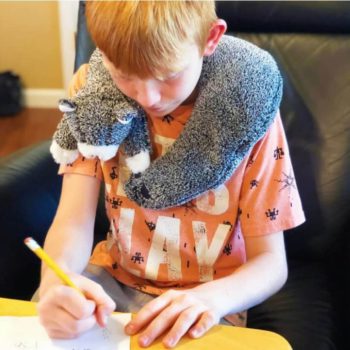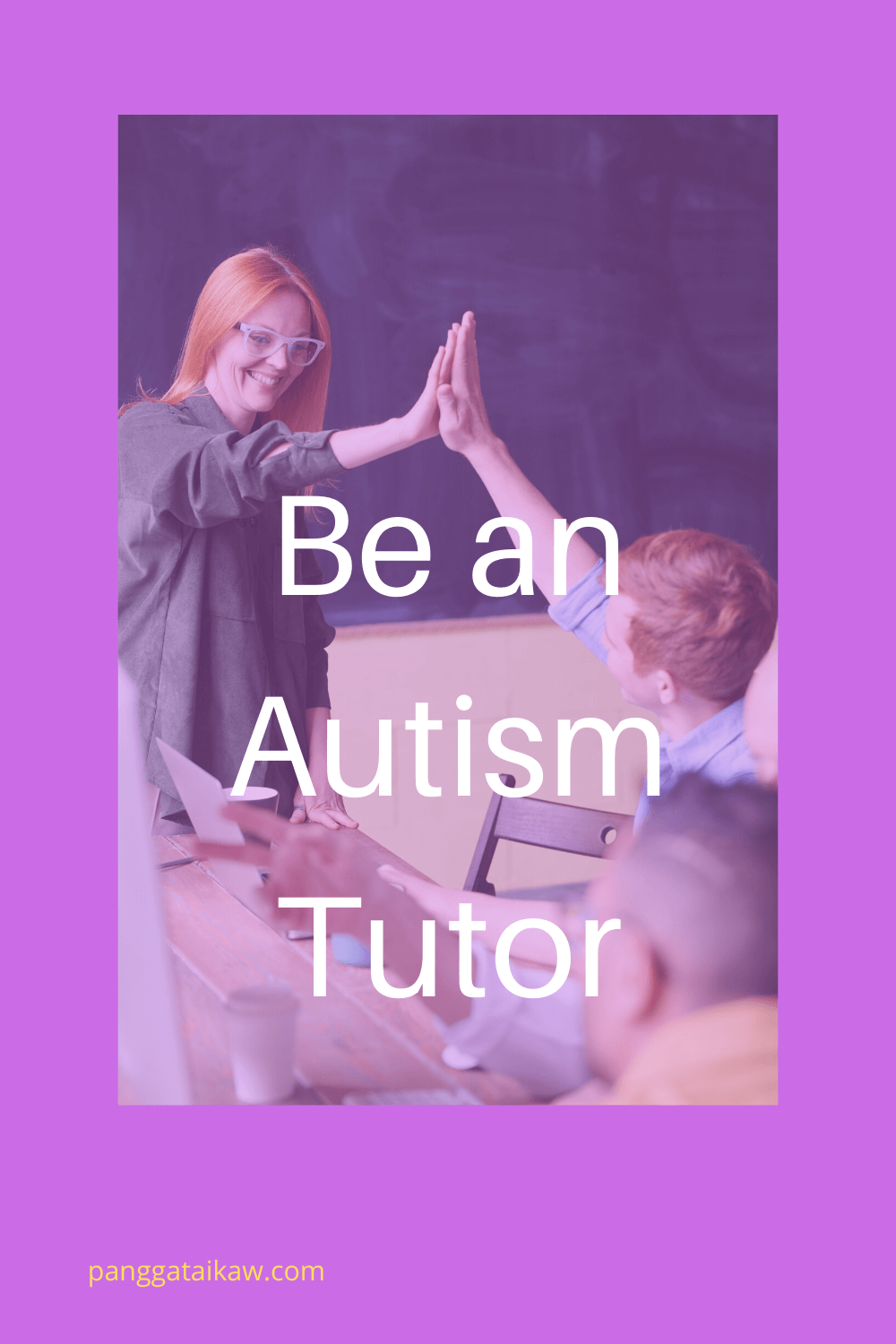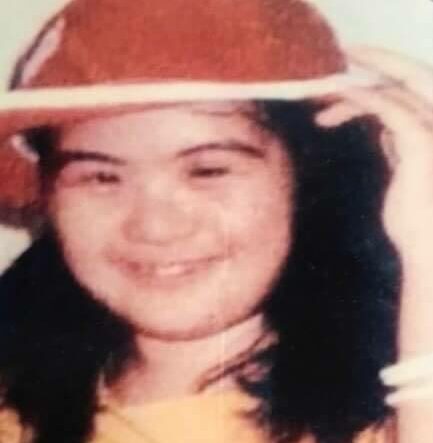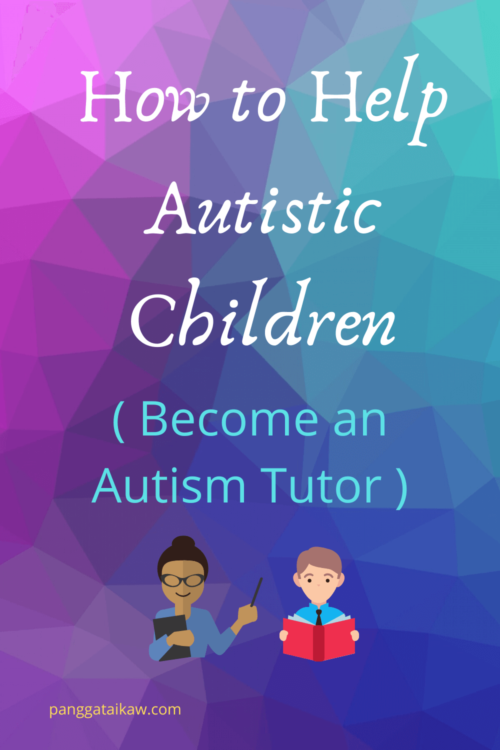I wanted to be an autism tutor. When I was a new immigrant some years ago, I thought it was awesome to be teaching kids with autism. I believed I could do it because I had clinical experience with kids. I knew how to help autistic children.
I knew it did not pay much, but being with kids again would let me use my medical skills.
I tried to apply once, somebody called and asked me if I was willing to relocate. Little did I know that the job as an autism tutor that I applied with was a few miles away from where we lived and would make it impossible for me to commute daily.
Of course, I couldn’t move to another place, having arrived only a few weeks back. I just accepted that it’s not meant for me.
So, I worked at a call centre just to earn something while I prepared to do exams to hopefully get a license to practice my profession in a foreign land.
Until one day, I was out of job again. Thinking of applying as an autism tutor for the second time, I did a first aid course hoping that I could be hired easily if I had this requirement.
Still, no luck!
With perseverance in looking for a healthcare-related job, I landed employment in Clinical Research.
This is where I met Rachel. We now work in the same department.
I know she recently graduated from a Psychology course and I learned that she used to work as an autism tutor.
One day, I introduced her to my website and while reading one of the posts, she exclaimed, ” This is also what I did! “I got excited and encouraged her to share her experiences tutoring children with autism and she gladly accepted my request.
Here goes Rachel’s story.

How many years did you work as an autism tutor?
“ I worked as an Autism tutor for a year and a bit, approximately from May 2017 to August 2018. This is when I switched to my new job as a Research Coordinator.”
What motivated or inspired you to become an autism tutor?
“While I was completing my undergraduate degree in honors psychology, I had an opportunity to volunteer with a school division, tutoring a young man who was diagnosed with autism spectrum disorder and Tourette syndrome.
Through this experience I found a passion for working with individuals with disability. Following this, I started doing respite for an adult with autism spectrum disorder and cerebral palsy, and decided I wanted to focus my undergraduate research in this area.
I met with a professor whose PhD is in the area of Applied Behavioral Analysis and we settled on thesis research looking at the results of a short-run early intervention program on skill acquisition in children diagnosed with autism.
The organization that I completed my research out of ended up being where I got my job as an autism tutor after I finished my degree. “
Can you describe your job? How old were the kids with autism whom you cared for?
” My job involved one-on-one program delivery for children diagnosed with autism spectrum disorder.
I worked with both families and children teaching a variety of individualized skill sets and goals in all facets of the child’s life. It heavily involved creatively finding new and interesting ways to deliver the needed programming within a variety of settings (e.g., daycare, pre-school and homes).
This also involved organizing and recording both data and notes on the progress of the child.
I had three clients during my time as an autism tutor; the age range was 3-5 years old.
I worked under both a senior tutor and an autism consultant; every child had a team of one or two tutors, one senior tutor and one consultant.
The consultant was responsible for providing and creating the programs for the children and the senior tutor was responsible for professional development of the tutor and assisting in program delivery where needed.”
Can you explain more on what you did as an autism tutor? What was your typical day like?
” Typically, I would have two clients over a year. I would spend one full day with one client, then the next day with the other client.
I shared my clients with another tutor so we would alternate days.
I would arrive at the client’s home early in the morning and look over the previous tutor’s notes from the day before. From there I would set up all my stimuli for the programs and skills I would be working on that day. An example of this would be setting up sorting stimuli for a program that requires the child to sort different colors of objects into piles.
The programs were all based on Applied Behavioural Analysis (ABA) principles and theory which focuses on positive reinforcement strategies. ABA focuses on the principles of learning in order to alter behaviours and improve skills.
Throughout the day I would run the programs provided by the autism consultant in between breaks of play and fun!
It was very important to keep things fun for the child and make the programs not feel like work, but like play as much as possible.
The child was able to work for play activities (e.g., playing in the backyard on the bike) or edibles (e.g., skittles).
We would take a lunch break as you would if you were in school and then at the end of the day I would write notes in our communication book for the tutor who was coming in the next day.
Sometimes my days involved attending preschool or daycare with the child and helping them work on their social skills. While I was in the home, the parents were there so we were able to collaboratively work as a team with the parents, senior tutor and autism consultant. “
 Did you have any struggles or challenges in your job?
Did you have any struggles or challenges in your job?
” Overall, my experience as an autism tutor was extremely rewarding.
However, working one-on-one with a child who struggled behaviourally could be very exhausting and I experienced some days where I felt extremely burnt out.
A significant challenge would be the independent and isolated aspect of the job. If the child had a particularly hard day, it was only me who was in the home and I had to be the one to figure out how to handle it and make the day more positive for the child.
Mostly, I enjoyed every day I spent with my clients and they had a very positive influence in my life and taught me so much.”
How did you handle a very difficult child?
” Every child diagnosed with autism spectrum disorder is so different.
Difficult or challenging behaviours manifest in a variety of ways. For the most part, if a child had any difficult behaviours the consultant would have a behaviour plan in place which had consistent steps on how to handle this behaviour.
Having a team consisting of the parents, senior tutor and consultant made for a very supportive environment and we would figure out how to handle challenging behaviour together in the most positive way for the child. ”
This post contains affiliate links. Please read the full affiliate disclosure here.

.

How did you involve the parents in teaching their kids?
” I believe I discussed this question a little bit above. However, yes the parents were heavily involved in teaching the kids. In fact, they had their own programs that were sometimes similar, or different, to the programs the tutors were running.
Parents worked privately with the senior tutor and consultant in order to learn how to deliver programs and were expected to work on these in their spare time with the child.
As well, the parents were able to speak with me before sessions, as well as after, with any concerns or questions they had about the progress of their child.
It was a very collaborative environment. In this type of early intervention it is so important that parents and tutors are all on the same page and keeping consistent expectations for the child.
If everyone is consistent with programs and expectations, the child will learn so much more! ”
How did you feel at the end of a workday?
” I usually felt pretty tired at the end of the day, but at the same time I left work feeling fulfilled and happy.
My clients made me laugh and smile every day!
Some days were harder than others but these just meant I had to
change what I was doing as a tutor in order to help the child have a
more positive day next time! “
What made you happy or fulfilled on a certain day?
” So much!
The most fulfilling thing was when you were working with a child on a certain skill for a long time and then it finally clicks and they learn that skill!
An example would be one of my clients struggled with verbal skills, in particular greeting others when getting to school. We worked on saying “Hello” and making eye contact for months and then one day when I walked in to the house they looked up at me and said “Hello, Rachel!”.
This was so rewarding because they had struggled with this skill for so long, and the child was so excited when they finally mastered it. “
What is your best advice on those who plan to pursue a career as an autism tutor?
” My advice would be to make sure you are okay with independent work.
One-on-one program delivery with a child, who is not always verbally able to communicate with you can be very isolating.
But if you are passionate about a career in helping people then it is an amazing and rewarding job. “
[amazon fields=”1986539970″ value=”thumb”].
Click the image to buy a book of your choice.
[amazon fields=”0807534811″ value=”thumb”]
How did you de-stress after a difficult day?
” After a particularly stressful day, I would try my best to go home and not think about it.
What helped would be taking time for self-care, whether that is having a bath, going to a yoga class, or spending time with friends and family.
When you are doing a job that involves being very attentive to others’ needs it is important that you are able to disconnect and take time to focus on your own needs as well!
Balance is everything. “
How have you made a difference in the life of an autistic child?
“ Within this job, there were many moments where I took time to reflect on the positive impact I was having on my client’s lives.
Typically, a child goes through a year of the program and then begins Kindergarten.
Probably the most rewarding moment is before kindergarten when as a team, we reflect on the child’s gained skills and how much they have learnt.
Doing this helps you realize all the things you taught the child and how much of an influence you had on preparing them to have success in Kindergarten and their later school years! “
What is the best lesson that you learned from a child with autism?
” This is a hard question because I have learnt so many!
My clients taught me just as much as I taught them.
The things I felt or thought before I started working as an autism tutor were only strengthened from this job.
If anything, I learnt the importance of appreciating every person’s individual differences and how everyone is special in their own way.
We have to accept people for who they are and celebrate these differences!
Like I mentioned above, every child with autism is so different, and this is what makes them special.
We have to focus on the balance between helping people live their lives to the fullest, and also not forcing them to conform to society’s expectations, we have to remember to celebrate what makes them special and unique! “

It is so rewarding being an Autism tutor
Rachel, from your stories, I know that doing this job made you a better person. More open to everyone’s differences and more patient with people’s shortcomings and inadequacies.
I may have been unlucky to do this job and not experience the feeling of fulfillment after a day’s physically tiring job, but the encounters that you shared, made me realize that being an autism tutor is one of those professions where money may not be great, but the rewards to yourself is so great having contributed to a special child’s well-being and preparing him to become the best version of himself.
Given the chance, I would still want to experience working as an autism tutor.
Originally published: January 11, 2019. Updated: May 17, 2020

If you are a parent of a child with autism spectrum disorder and he is taken cared of by an autism tutor, please share with us how your child is being helped and how he is developing and trying to evolve to be the best that he can be.




Must be really challenging to be an Autism tutor if you don’t have the passion for it. My siblings are all in the medical field except myself so I really appreciate all the patience and dedication they put in their jobs just like Rachel.
Maybe it’s not too late for you to do it, too. I wish you luck!
Odette
Hi Odette,
You got it, passion is the key to enjoy your job as Autism tutor, like Rachel.
I’m too comfortable in my current job, so I’m happy now.
Cheers,
Marita
My good friend has a brother who is autistic so I tend to read up on it from time to time. Reading your interview with Rachel really helped me to get a different perspective.
Thank you for the insightful post. I think having a family member or a friend who has an autistic family member means you need to have some kind of understanding of the needs and ways of teaching autistic human beings.
Hi Justin,
Good to know that you learned something from the interview.
Of course our autistic kids are wired differently so they really need lots of understanding and love.
And they can learn so our tutors and SPED teachers will be able to help a lot and they need the parents’ support and follow up at home for them to get the best of the learning from school.
God bless,
Marita
Thanks for explaining that consultants will have plans in place about how to handle children whose behavior is very difficult. My husband and I have a son on the autism spectrum and are currently trying to find a program where he can work with a consultant. I’m glad I read your article because now I can ask potential programs about how they handle difficult behavior in special needs children.
Hi Daphne,
Glad you learned something from my post. There are lots of support for kids in the autism spectrum disorder.
You can ask your family doctor. I hope that he can refer you to these programs.
Where do you live? Is your son enrolled in a special education ( SPED ) program? Even SPED teachers can help you with some referrals. These consultants and therapists can even work with your child in his school.
I hope you find the appropriate consultant for your son.
God bless,
Marita
Hi Marita,
I love this post so much!
And yes whenever I speak to anyone who works with children with additional needs they always get a hug or a kind word from me because they make such a huge difference to the kids as well as to their families.
One of the most special kids I know is on the spectrum. He is now 10 years old and is still largely non verbal.
However, it doesn’t stop his face lighting up when he sees me, and running over to give me a hug. He doesn’t hug many people so for me this is an honour.
His arrival has had a huge impact on his family, they have learnt so much from him, as have all the lives that he has touched.
Warmest regards Marita.
Hi Melissa,
Thanks for honoring people like Rachel who work with special needs kids.
I’m happy to know that you are touching the life of the 10 year old boy by being his friend and giving your unconditional love. They all need people like you who are always ready to give them hugs and receive theirs as well.
God bless,
Marita
Hi Melissa,
Thanks so much for taking the time to read our post. Your comment made me smile, that is exactly how I feel about all the children I worked with
Rachel
Hi I really enjoyed reading your post about how to help autistic children.
I can tell that you have a lot of passion for it. You spent a lot of time interviewing Racheal to find out what she did during her job as an autism tutor and what kind of clients she worked with and other experiences related to being an autism tutor.
I do not know much about autism but I have several experience being a tutor and one thing that I must note is that one must have a lot of patience to be a tutor. I was tutoring university kids so my experience was a bit different but I used a lot of rewards and easy to follow lesson plan.
Your post is amazing because people like us who know so little about autism can learn more a little more about it from Rachel’s experience.
Thank you for your post.
Take care
Regards
Pam
Hi Pam,
An autism tutor like Rachel, needs much more patience and understanding than a regular tutor, like you.
Most of the kids that they care for are non-verbal and unable to share their needs and feelings. it is really amazing how they help and contribute to their client’s needs and development of their potential.
Thanks for reading!
Marita
This is an awseome post, and people like Rachel are so special for helping kids out that neednif.
My cousins son is austistic and it took them forever to find someone that would help their child out. So again I’m glad there are people like Rachel out there willing to help these kids.
Also I hope you will be able to help them as well in the future if that’s still what you want to do.
Do you plan on doing this, or just focus on your blog and help these kids out that way, or both?
Hi Michael,
I’m not sure if I can still work as an Autism tutor.
I have a full time job now, but hopes to do full time online marketing in the next 2-3 years. Of course, my website will always be there to support our special kids.
Rachel and all autism tutors ad other therapists definitely help children with autism spectrum disorder to develop their fullest potential.
Thanks for reading.
Marita
Thank you for sharing this great interview very well executed.
I don’t know to much about autism but I’m so glad they’re people doing this type of work to this kids with this problem if can call it problem. At my kids school have a program for special kids and is so touching to see how the teachers help and care for those kids. God bless this teachers you friend Rachel and everyone who takes care this kids.
These kids have no ” problems” at all, they have ” special needs ” that can always be helped by autism tutors, therapists and special education teachers.
God bless,
Marita
Your background and mine are very similar, but mine is a little bit different. Reading Rachel interview brings back memories. Originally I am from Thailand and I came to work in the States as an Aupair. In order for me to be qualified as an Aupair, I need to work for certain hours at a certified Kindergarten establishment and get the reccommendation from them. That is where I learned how to care of children with autism. Rachel described the work day perfectly. Some day they will be as cute as a button but some day phew! They are just like us where we have our good days and bad days but we know how to handle and express it but they cannot. I had to constantly be right next to this child, when he gets aggravated he tend to smack his head at anything in sight. I didn’t know how to handke it in the beginning but the senior showed me how to calm them down and slowly train them not to hurt themselves and we will reward them later. It was a good life lesson. I will share this post to my friends who still work with kids.
Take care
Thanks for sharing your experiences.
Most probably, you have witnessed sensory meltdowns, which are quite common to these kids and the caregivers need to know how to handle them, to avoid hurting themselves further.
Sometimes even the caregivers and teachers, are also hurt, because these kids cannot control their episodes.
Have a good day!
Marita
I love what you said about children having both good and bad days just like us. Such a good outlook, it sounds like we shared similar experiences through our work. Thanks so much for commenting!
Rachel
I have a cousin that they diagnosed with autism. They actually give him pills and I think that makes the situation worse because medical drugs don’t help the child in the long run. I strongly believe that kids with autism needs special support and with that support comes love.
I recall my spring semester in my sociology class my professor was talking about autism and I remember someone in my class spoke about it. He said that he feels the autism pills didn’t help him but his will power and love and support from his family. In addition, another peer said that he think the pills helped him but to an extent, sorry for the rant.
I wish you the best in your journey!
The doctor whom your cousin is seeing might have prescribed those pills not for autism per se but for something else. His parents need to talk to the doctor about them.
Of course, family support and timely intervention are very helpful. Just like guidance from an autism tutor and other therapists at a very early age when diagnosis is known.
Thanks for the well wishes.
Marita
Kudos for the informative post! I personally observed that you really have the passion for helping and taking care of autistic children, though there may be certain challenges to be faced such as the one you faced in trying to secure the job of an autism tutor. Kudos for getting in touch with Rachel – a like-minded person! Thanks for the awesome post!
Hi Israel,
Thanks for reading and for the nice comments.
Marita
As exhausted as Rachel was after every day, I am willing to bet she would not trade her job for anything else. I’m sure she has a charge running through her body that she would not get at any other job. Reading about the efforts of these children to say “Hello Rachel” makes me realize that I take my ability to speak for granted. And in fact, sometimes I misuse my powers of speech by becoming arrogant or insulting. But reading this post greatly reduces the chance of that happening again. Thank you for a window into your world.
Hi Terrence,
I agree, we usually take for granted things or capabilities that we have until we see other people struggle with these things, like speech and communication.
Most of our children with autism spectrum disorder actually have delays in communication and social skills. So our autism tutors like Rachel do really help them overcome these.
Glad that this post opened up your eyes to better yourself.
Marita
Hi Terrance,
Thanks so much for your lovely comment. I have never had the same rewarding feeling from any other job. Truly a special experience. It is true we take so many of our own skills for granted, I also realized this while tutoring.
Rachel
What a great field to get involved in. I know a number of families in my area that have children with autism. I have never thought about being a tutor for them but I can imagine that it would be very rewarding. Nowadays it seems like there are so many children and adults with autism. I have been wondering what the cause of the increase in cases is?
Hi Cory,
The exact cause of autism is unknown. However, researches have shown that there is a genetic predisposition involved, meaning, certain genes that kids inherit from their parents would make them more vulnerable to develop autism spectrum disorder ( ASD ).
So it’s common to see siblings, especially twins having ASD.
I believe, we see an increase in cases because of more researches coming up on how to diagnose and help people with ASD plus the government and the community are more informed and more involved.
Definitely, being an autism tutor is very rewarding.
Have a great day!
Marita
Hi Cory!
Thank so much for reading and commenting. Just as Marita mentioned, the increase in diagnosis largely stems from improved practice and research influencing the recognition of the importance of an early diagnosis.
Rachel
This is a fascinating story about both you and Rachel, and I really hope that you will succeed in your ambition to become an Autism Tutor.
At one time I worked in the Autism Unit of a school for children with special educational needs. There were 12 children in the unit, and the degree of their autism varied from very severe to some much higher functioning children with Asberger’s syndrome.
Yes, of course it was hard work, but as you say it was very rewarding to watch the children make progress, and the strategies which the Head of the Unit had in place for dealing with challenging behaviour were very effective as they needed to be in order that the other pupils would not be unduly disturbed by it.
Very many thanks for tour truly interesting post.
Chrissie
Hi Chrissie,
Happy to know that you have also similar experiences as Rachel in helping kids with ASD.
Seeing these kids evolve to somebody who are able to properly communicate with people around them is definitely rewarding.
Thanks for sharing.
Marita
Hi Chrissie!
Thanks for reading and commenting. It sounds like we share similar experiences working with children with autism.
Rachel
I must appreciate you for taking it upon yourself to help autistic children. There are lot of children out there suffering from autism and it is really touching. I want to ask you that as the government helped you in one way or the other in the course of helping this children.
Hi,
Rachel worked as autism tutor and earned an hourly income from the government. The programs intended for the children with autism spectrum disorder in the institution where she worked were also funded by the government.
As Rachel shared in the interview, she was deeply touched and inspired by these kids that interacting with them was like playing with them everyday.
Thanks for reading.
Marita
I believe Marita did an excellent job answering your questions. Thanks so much for reading and your nice comment!
Hi Marita,
Thank you very much for sharing this great article about helping autistic children. We have a small team of child care foundation who dedicatedly serve those autistic children. Some time it is difficult to teach them but children really likes learning while playing. I believe your article is very helpful for our team and going to share it with them. I am looking forward more article on this in future and going to bookmark your page.
I’m happy that my website and the articles are able to help parents and organizations like the one that you’re involved with.
Timely and early support are vital for our children with autism for them to reach their fullest potential. There are challenges definitely in them that need to be addressed and they need the help of our therapists, tutors like Rachel, and special education teachers.
I appreciate your concern.
Marita
It is so nice to hear that you think this article will be helpful to share with your team! I appreciate the nice comments.
Good Day, Marita.
One of the most “human” posts I’ve read in a long time.
I have family that do similar work and while it is very rewarding, it is also very taxing, emotionally. Finding the balance to maintain “your” well-being is a must. You can only help others when you are well rested.
I applaud your efforts and these children are blessed to have such selfless people as yourself to guide them along, not to forget the relief that it brings to the affected families.
Continue your valued efforts,
Paul
Hi Paul,
Definitely, we need to be emotionally and physically well to extend our help to others, especially to special kids.
Thanks for your concern and sound advise.
I will continue my mission, with the help of generous donors, to support our children with special needs.
God bless,
Marita
Hi Paul,
Thank you so much for your kind words about the article. You are right finding that balance is so important.
I admire you, you and Rachel, for your passion in helping autistic kids. That’s not ordinary, and I will admit it’s not my cup of tea. But, seeing some of my neighbors struggle with this problem, they have autistic children that are not well-attended to, I can relate to your personal mission of helping them out with this website. This website can be a good resource for parents looking for ideas on how to deal with their children’s future. I promise, I will share the link to this website to friends with autistic children.
By the way, is it true that an autistic child, if not helped properly, his or her lifespan gets shortened than what is expected of them? I asked this because, I have a friend with an autistic child and the child recently passed away. It’s hurting to see the parents blame themselves for not being able to send the child to an autistic learning center. How does it affect the lifespan of the child? How does educating an autistic child ensure he or she will live longer? I’m sorry, as I don’t understand.
Hi Gomer,
Children with autism, like other kids have the capacity to learn and develop fully. They just have some challenges that they need to overcome, of course with proper early intervention, like help from an autism tutor, like Rachel and other therapists, plus special education in schools.
Their lifespan is not directly affected if they are not given timely support, it’s their capacity to reach their fullest potential that will be affected. But maybe, if they don’t learn to communicate properly even at a later age, then, if they have serious health concerns that need to be addressed at a certain time, that maybe the reason for their untimely demise.
Thanks for reading.
Marita
Hi Gomer,
Thank you for your kind comments and I’m glad you enjoyed the article
Thanks for this post, honestly before now i knew less or nothing about autistic children as i have never seen or came across any and then this article came along and touched me deeply though i am not a medical practitioner i would to know more and is there any course that i can engage myself in to be of help?
Hi Seun,
If you would like to become an Autism tutor like Rachel, you can enrol in a Psychology course or any health care -related ones, like Nursing or Health care aide, or Child care courses.
I believe, the institution who will hire you will also train you once they accept you. But of course, you need to have some background in the health and well being of kids and their proper care.
A first aid course is also a requirement.
You will be an awesome tutor, with your compassionate attitude.
Thanks for sharing.
Marita